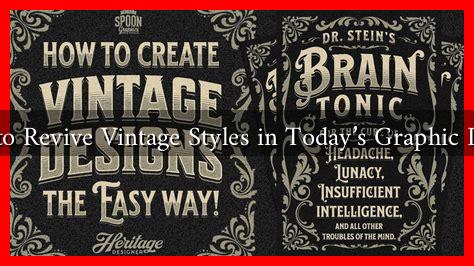-
Table of Contents
How to Revive Vintage Styles in Today’s Graphic Design
In the ever-evolving world of graphic design, trends come and go, but vintage styles have a timeless appeal that continues to resonate with audiences. Reviving vintage aesthetics not only adds character to modern designs but also connects with nostalgia, evoking emotions and memories. This article explores how designers can effectively incorporate vintage styles into contemporary graphic design, providing insights, examples, and practical tips.
The Allure of Vintage Design
Vintage design is characterized by its unique charm, often drawing inspiration from past decades. The resurgence of interest in retro styles can be attributed to several factors:
- Nostalgia: Many consumers have a fondness for the past, which can be leveraged to create emotional connections.
- Authenticity: Vintage designs often convey a sense of authenticity and craftsmanship that modern designs sometimes lack.
- Distinctiveness: In a saturated market, vintage styles can help brands stand out by offering something unique.
Identifying Key Vintage Styles
Before diving into the revival of vintage styles, it’s essential to identify which eras and styles resonate with your target audience. Here are some popular vintage styles to consider:
- Art Deco (1920s-1930s): Known for its geometric shapes and luxurious details, Art Deco can add elegance to modern designs.
- Mid-Century Modern (1940s-1960s): Characterized by clean lines and organic forms, this style is perfect for minimalist designs.
- Retro (1970s-1980s): Bold colors and playful typography define this era, making it ideal for brands targeting younger audiences.
Techniques for Reviving Vintage Styles
Once you’ve identified the vintage style you want to incorporate, consider the following techniques to effectively revive it in your designs:
1. Typography
Typography plays a crucial role in vintage design. Consider using:
- Serif Fonts: Fonts like Baskerville or Garamond evoke a classic feel.
- Handwritten Fonts: These can add a personal touch reminiscent of vintage signage.
- Custom Lettering: Creating unique lettering can enhance authenticity.
2. Color Palettes
Vintage color palettes often feature muted tones or pastel shades. To achieve this:
- Use Earthy Tones: Colors like olive green, mustard yellow, and burnt orange can evoke a retro feel.
- Incorporate Pastels: Soft pinks, blues, and greens can create a nostalgic atmosphere.
3. Textures and Patterns
Adding textures and patterns can enhance the vintage aesthetic:
- Grainy Textures: Use overlays to give a worn-out look.
- Patterns: Incorporate polka dots, stripes, or floral designs that were popular in vintage eras.
Case Studies: Successful Vintage Revivals
Several brands have successfully revived vintage styles in their graphic design, demonstrating the effectiveness of this approach:
- Pepsi: The brand’s retro logo redesign in 2008 drew inspiration from its 1970s branding, appealing to nostalgia while maintaining modernity.
- Levi’s: The use of vintage-inspired advertising campaigns has helped Levi’s connect with consumers who appreciate authenticity and heritage.
Conclusion
Reviving vintage styles in today’s graphic design is not just about nostalgia; it’s about creating meaningful connections with audiences. By understanding the allure of vintage design, identifying key styles, and employing effective techniques, designers can craft compelling visuals that stand out in a crowded marketplace. As trends continue to evolve, the timeless appeal of vintage aesthetics will remain a valuable tool for graphic designers looking to create impactful and memorable designs.
For further inspiration and resources on vintage design, consider visiting Creative Bloq.

